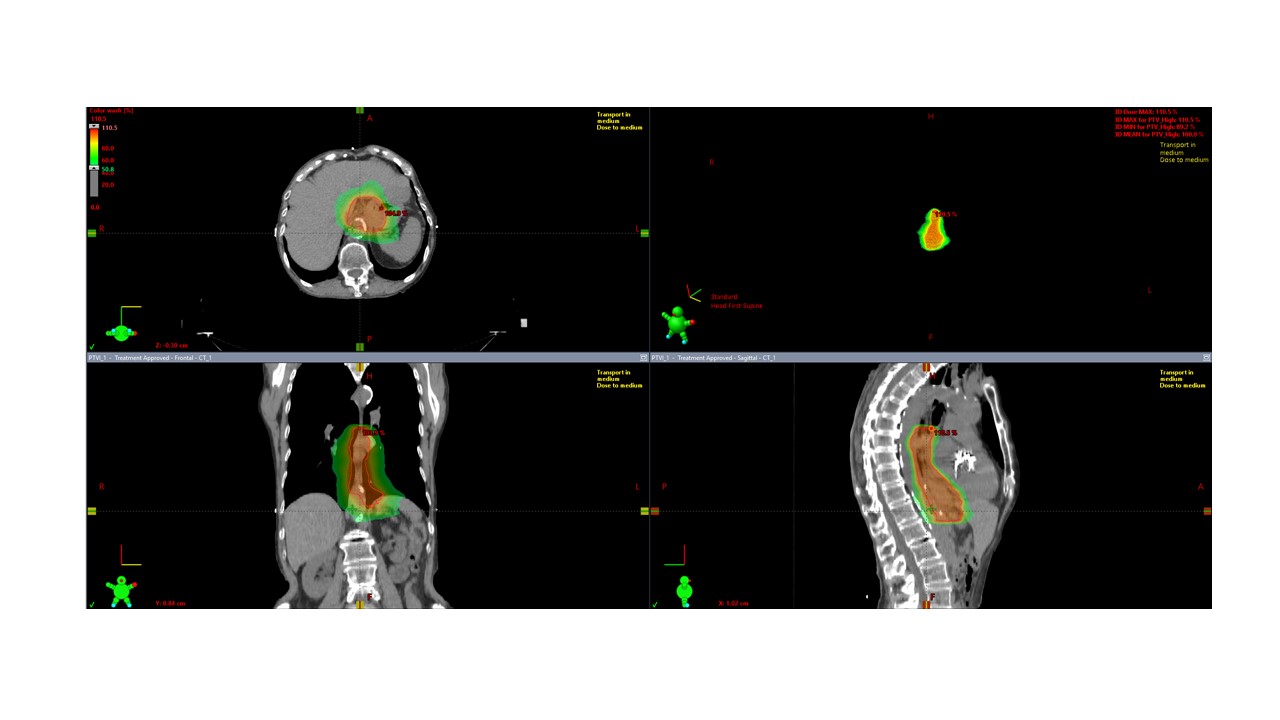Frail and Elderly Patients with Oesophageal Cancer: the challenge of hypofractionated radiotherapy.
Letizia Deantonio,
Switzerland
PO-1310
Abstract
Frail and Elderly Patients with Oesophageal Cancer: the challenge of hypofractionated radiotherapy.
Authors: Letizia Deantonio1, Stefano Leva1, Antonella Richetti1, MariaCarla Valli1
1Oncology Institute of Southern Switzerland, Radiation Oncology Clinic, Bellinzona, Switzerland
Show Affiliations
Hide Affiliations
Purpose or Objective
To evaluate feasibility, safety, and dosimetric results of volumetric
modulated arc therapy (VMAT) to deliver hypofractionated radiotherapy (RT) in
oesophageal cancer elderly patients, unfit for a multimodality curative
strategy.
Material and Methods
From June 2010 to October 2021, thirty-two patients were treated with
hypofractionated VMAT for palliative/symptomatic setting. The prescription dose
was 40 Gy in 16 fractions (EQD2 41.7 Gy considering an alfa/beta ratio of 10
Gy, and 44 Gy considering an alfa/beta ratio of 3 Gy).
Results
 Eleven patients (31%) were symptomatic for grade 3 baseline dysphagia.
RT was well tolerated; no patient interrupted the daily treatment. Acute
toxicity was mild; no G3 acute toxicities were reported. At the end of
treatment, 7 patients (22%) experienced a stable dysphagia and 22 (69%) an
improvement of baseline dysphagia, while 3 patients (9%) reported a worsening
of esophagitis. At a mean follow-up of 9 months, 18 patients (56%) had a
complete clinical recovery (G0-1) of the symptomatic moderate/severe dysphagia.
At 3 months after the end of RT, 9 patients (28%) achieved a partial or
complete response. Two coplanar arcs were employed for VMAT delivery.
Dosimetric results were consistent in term of both target coverage and normal
tissue sparing.
Eleven patients (31%) were symptomatic for grade 3 baseline dysphagia.
RT was well tolerated; no patient interrupted the daily treatment. Acute
toxicity was mild; no G3 acute toxicities were reported. At the end of
treatment, 7 patients (22%) experienced a stable dysphagia and 22 (69%) an
improvement of baseline dysphagia, while 3 patients (9%) reported a worsening
of esophagitis. At a mean follow-up of 9 months, 18 patients (56%) had a
complete clinical recovery (G0-1) of the symptomatic moderate/severe dysphagia.
At 3 months after the end of RT, 9 patients (28%) achieved a partial or
complete response. Two coplanar arcs were employed for VMAT delivery.
Dosimetric results were consistent in term of both target coverage and normal
tissue sparing.
Conclusion
Hypofractionated VMAT is an effective palliative treatment option in symptomatic
advanced oesophageal cancer patients, non-suitable for a standard curative
treatment.